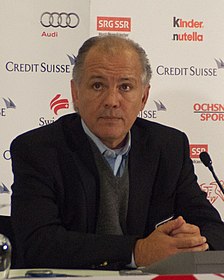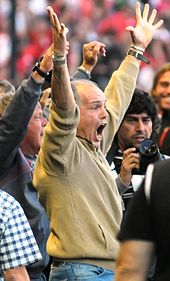Alejandro Sabella
| Alejandro Sabella | ||
 Alejandro Sabella, 2012
|
||
| Personnel | ||
|---|---|---|
| Surname | Alejandro Javier Sabella | |
| birthday | 5th November 1954 | |
| place of birth | Buenos Aires , Argentina | |
| date of death | December 8, 2020 | |
| Place of death | Buenos Aires , Argentina | |
| size | 175 cm | |
| position | midfield | |
| Men's | ||
| Years | station | Games (goals) 1 |
| 1974-1988 | River Plate | 118 (11) |
| 1978-1980 | Sheffield United | 76 (8) |
| 1980-1981 | Leeds United | 23 (2) |
| 1982-1985 | Estudiantes de La Plata | 149 (10) |
| 1985-1986 | Gremio Porto Alegre | ? (?) |
| 1986-1987 | Estudiantes de La Plata | see 1982-1985 |
| 1987-1988 | Ferro Carril Oeste | 27 (2) |
| 1988-1989 | CD Irapuato | 31 (0) |
| National team | ||
| Years | selection | Games (goals) |
| 1983 | Argentina | 8 (0) |
| Stations as a trainer | ||
| Years | station | |
| 1989-1994 | River Plate (Assistant Coach) | |
| 1994-1998 | Argentina (assistant coach) | |
| 2000-2001 | Uruguay (assistant coach) | |
| 2001 | Parma FC (assistant coach) | |
| 2003 | CF Monterrey (assistant coach) | |
| 2005 | Corinthians São Paulo (assistant coach) | |
| 2006-2007 | River Plate (Assistant Coach) | |
| 2009-2011 | Estudiantes de La Plata | |
| 2011-2014 | Argentina | |
| 1 Only league games are given. | ||
Alejandro Javier Sabella (born November 5, 1954 in Buenos Aires ; † December 8, 2020 there ) was an Argentine football player and coach .
As a player, he won three Argentine championship titles with CA River Plate in the 1970s and two more with Estudiantes de La Plata in the early 1980s . As a coach, he won the 2011 Argentine championship with Estudiantes, having won the Copa Libertadores with the club two years earlier. From 2011 to 2014 he was the coach of the Argentine national team , with whom he lost the final against Germany 1-0 at the 2014 World Cup in Brazil .
Career
Player career
Sabella started in the early 1970s in the youth team of his home club River Plate as an attacking midfielder. After the transfer of Norberto "Beto" Alonso to Olympique Marseille , who previously played in his position, he played a decisive role in winning the Torneo Metropolitano in 1977 as the "elegant number 10" . After Alonso's return, he had to make do with a place on the bench.
In July 1978 he moved to Sheffield United in the second highest English league for £ 160,000 after they could not sign the then 18-year-old Maradona . With Sheffield Sabella, called Alex Sabella in England, rose in his first season to the third division, but stayed for another year. The club only reached twelfth place here. Sabella was remembered for a long time at Sheffield United and was named in the club's "Team of the Century" in 2000.
In 1980 he moved to Leeds United in the English first division for £ 400,000 after previously refusing a move for £ 600,000 to second division club Sunderland AFC . With Leeds, he was ninth in the league in the first season and scored two goals in 23 games. In the new season he was no longer used.
Carlos Bilardo , coach of Estudiantes de La Plata , was able to buy you rights to him for $ 2,000 for the club. He said goodbye to Leeds in December 1981 and returned to Argentina after only a year and a half in West Yorkshire . With Estudiantes he won the Torneo Metropolitano in 1982, although he could not play in the final here due to injury, and in 1983 the national championship. For Estudiantes it was the first championship title since the only national triumph in 1967.
In 1983 he was appointed to the Argentine national football team by the now national coach Bilardo and took part in all games at the Copa America 1983 , where Argentina was eliminated in the group stage behind Brazil. In total, Sabella played eight games for Argentina until 1984.
From 1985 to 1986 he played in Brazil with Gremio Porto Alegre and won the Campeopnato Gáucho, the national championship of Rio Grande do Sul , with the club in both years . In 1986 he returned to Buenos Aires, where he initially ran again for Estudiantes before moving to Ferro Carril Oeste in 1987 . In 1989 he still had an engagement in Mexico with CD Irapuato where he ended his playing career the following year.
Because of his deliberate way of playing, he was nicknamed Pachorra (in German: "Inertia") as a player .
Coaching career
After the end of his playing days, he initially worked as assistant coach to Daniel Passarella for River Plate (1989-1994), the Argentine national soccer team (1994-1998), the Uruguayan national soccer team (2000-2001), Parma FC (2001), CF Monterrey (2003), Corinthians São Paulo (2005) and again River Plate (2006-07).
From 2009 to 2011 he was the coach of Estudiantes de La Plata and won the Copa Libertadores 2009 with the club after a 2-1 win at Cruzeiro EC in Belo Horizonte . In the subsequent Club World Cup, Estudiantes lost to FC Barcelona in the final 2-1 in extra time, which earned him his second nickname el Mago (the magician). In 2010 he won the Torneo Apertura of the Argentine championship with Estudiantes, the fifth championship in the club's history
He had already made an agreement with Al-Jazira Club from Abu Dhabi in the Emirates when he was appointed to succeed Sergio Batista in July 2011 after the quarter-finals from Argentina at the 2011 Copa America . In qualifying for the 2014 World Cup , he took first place with Argentina. At the finals in Brazil, he moved with the Albiceleste to a 4: 2 semi-final on penalties against the Netherlands in the final final one. There Argentina lost to Germany in extra time with 0-1. The Argentines' most famous players were hereLionel Messi , defender Javier Mascherano and strikers Gonzalo Higuain and Sergio Agüero . On July 30, 2014 Sabella resigned as national coach and left his place to Gerardo Martino .
In August 2015, his appointment as the national coach of Saudi Arabia was announced, but a few days later the failure of the negotiations was announced. In 2016 he fell ill with throat cancer, which meant the end of another coaching activity.
After receiving treatment in a hospital in Buenos Aires from the end of November 2020, he died there on December 8, 2020 at the age of 66 from complications from a heart condition. After he was laid out in the headquarters of the Argentine Football Association, he found his final resting place in the Cementerio Parque Campanario in the south of the province of Buenos Aires near La Plata .
successes
As a player
- Winning the Argentine Championship with River Plate
- Primera División Argentina 1975,
- Nacional 1975
- Primera División Argentina 1977
- Winning the Argentine Championship with Estudiantes de La Plata:
- Primera División Argentina 1982, 1983
- Gremio Foot-Ball Porto Alegrense
- National Championship of Rio Grande do Sul : 1985, 1986
As a trainer
- National team of Argentina
- Vice World Champion 2014
- Estudiantes de La Plata
- Copa Libertadores : 2009
- Argentine Championship (Torneio Apertura): 2010
Web links
- Subcampeón mundial: Murió Alejandro Sabella, un símbolo de la sobriedad y la jerarquía en la elite del fútbol , Clarin , December 8, 2020
- FIFA.com: Messi's new coach: the 'magician' set to work a miracle
- Alejandro Sabella in the database of weltfussball.de
- Alex Sabella (Internationals for Argentina), 11v11.com
Individual evidence
- ↑ rsssf.com: Copa América 1983 (squad)
- ↑ FIFA.com: Sabella succeeds Batista
- ↑ Sabella leaves the vice world champion. In: fussball-wm-total.de. FOOTBALL WORLD CUP total, July 30, 2014, accessed on July 30, 2014 .
- ^ Alejandro Sabella murió a los 66 años. December 8, 2020, accessed December 10, 2020 (Spanish).
| personal data | |
|---|---|
| SURNAME | Sabella, Alejandro |
| ALTERNATIVE NAMES | Sabella, Alejandro Javier (full name) |
| SHORT DESCRIPTION | Soccer player and coach |
| DATE OF BIRTH | 5th November 1954 |
| PLACE OF BIRTH | Buenos Aires |
| DATE OF DEATH | December 8, 2020 |
| Place of death | Buenos Aires |

